Celebrating the passion, dedication and personal stories of Social Ecology faculty, staff, students, alumni and benefactors, “The Dean Asks…” is a feature in which Dean Valerie Jenness interviews people inspired by the pursuit of excellence and encourages participation in interdisciplinary education to solve complex societal problems. Over the next year, please check back to read or listen to additional installments. View Archive
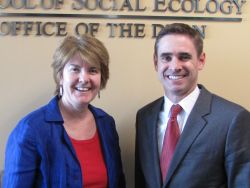 Valerie Jenness, Dean of the School of Social Ecology, interviewed alumnus Sean Burton '93 about his memories as a student, his career path that started with an internship in the White House, and current business endeavors as President of CityView, an investment firm focused on workforce housing.
Valerie Jenness, Dean of the School of Social Ecology, interviewed alumnus Sean Burton '93 about his memories as a student, his career path that started with an internship in the White House, and current business endeavors as President of CityView, an investment firm focused on workforce housing.
Val: Sean, tell us a little about yourself and your experiences as a Social Ecology student.
Sean: I'm a graduate from UCI and the School of Social Ecology in 1993. I grew up in California, in Santa Barbara primarily, but also in the Pacific Northwest. I started school in the fall of '88. I didn't come in as a Social Ecology major. I wanted to be a writer, so I came in as an English major. My father was a writer and I had grown up wanting to be a writer. I spent about a year and a half in English, and it was difficult to get classes and I had friends taking Social Ecology classes and raving about them, particularly the environmental and social behavior classes. I took a class by Roxy Silver, Introduction to Research Design, and it was one of the most amazing classes I had ever taken. Professor Silver got us to think in different ways. She taught us to look behind the news articles you were reading, and look behind the research studies that you read about in the paper, and really understand how they were put together. You realized that there was more than one answer. Everything wasn't simple, and it really influenced my life and it changed the way that I thought. After Professor Silver’s class, I decided that I wanted to major in Social Ecology. All of a sudden I studied harder than I ever studied before, and I engaged with the material.
Val: Roxy Silver not only immediately remembered you when I asked her about you, she says, "I think I have some letters of recommendation I wrote for him." Roxy is great at remembering people and individualizing them.
Sean: Roxy was amazing. I also took classes from Professor Gary Evans and ended up doing research for him and Roxy, and just became fully enmeshed.
Val: Back then, what was the general understanding of what Social Ecology was?
Sean: We use to say that we would “plan parties for trees!” I have described Social Ecology many times over the years and what I thought was interesting about Social Ecology was its interdisciplinary aspect. We would address an issue like crime for example, and professors wouldn't just give you one perspective on it. Maybe a psychologist would say one of the causes of crime is that you have to look at the upbringing of the person and how it affected their behavior. A sociologist would say that you have to look at crowding and other societal issues. An economist would say you have to look at socio-economic class. So with each problem we were taught to look at it from different angles. It was one of the most powerful aspects of Social Ecology, and it is something that lead me to go into public policy. I didn’t think you could craft public policy with just a narrow viewpoint of the solution- you had to draw on the best ideas from different areas.
Val: As a student, where did you do your field study?
Sean: I did a field study at the Office of the Orange County Counsel, in the legal area. I was interested in the law, liked to write and I thought law school may be in my future
Val: I know you eventually went to law school, so how did you go from Social Ecology to law school?
Sean: It was an interesting route. I actually had taken a class in Social Ecology on healthcare and I really got passionate about it. I ended up writing a paper on how to solve the nation's healthcare issues. It ended up being very helpful to me personally because I got involved in politics while I was a student. It was during a campaign in 1992. A classmate at UCI invited me to a speech in '91- a breakfast that was happening out at Western Digital. I went because there was a free breakfast, and he said, "The Governor of Arkansas is going to speak and he's really interesting." I heard Bill Clinton speak for the first time. I hadn't really been political up to that time in my life, but here was someone who was a Democrat and he spoke about how important it was to create opportunity for everybody and to level the playing field. He said we had to use our community institutions to do that, but he also added an element of responsibility- saying if we do that, there's an element of personal responsibility that people have to take on and it was called the Core Value's Community Opportunity Responsibility. It just made so much sense to me that I became inspired. So I found where the campaign office was and I walked in there and they put me in charge of UCI for the campaign. I had no experience, but I set up the Clinton-Gore victory campaign '92 at UCI. There was a lot of excitement back then because Bill Clinton was young and it was kind of a change of generation from those born after World War II. So we ended up throwing an event for Clinton over at the big amphitheater on Harbor Boulevard about three weeks before the election. It holds about 15,000 to 20,000 people. We had 70,000 people show up! To accommodate this, I had to race over to the local dealership and rent a big flatbed truck and drove it over and put up a microphone. Clinton got up on the truck and he spoke to all the crowds in the parking lot.
After this event, a friend of mine who was a UC Irvine graduate, knew someone in the administration who was going to be on Al Gore's transition team. So I called him up and he was very friendly to me and he invited me to Washington. I didn't have any kind of family connection and I had never been to the East Coast. It was a really big, big deal for me.
Val: And how old are you at this point?
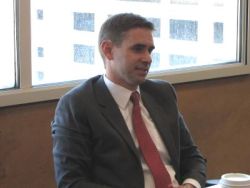 Sean: I was 21. I decided to go but I still had to finish school and I was graduating in June. This was in about February. I went out to D.C. and I was very clueless. I got off the metro at Farragut West metro stop, and I walked up to a hotdog vendor and I said, "Do you know where the White House is?" He said, "It's right there." I mean that's how clueless I was. I went in and met a friend who introduced me to folks. He sent me up to Capitol Hill and it was a great experience.
Sean: I was 21. I decided to go but I still had to finish school and I was graduating in June. This was in about February. I went out to D.C. and I was very clueless. I got off the metro at Farragut West metro stop, and I walked up to a hotdog vendor and I said, "Do you know where the White House is?" He said, "It's right there." I mean that's how clueless I was. I went in and met a friend who introduced me to folks. He sent me up to Capitol Hill and it was a great experience.
I came back and I started to apply to graduate schools because I knew I was going to be graduating in June. I got a call one day from a guy I met-another Irvine graduate-and he said, "I noticed that one of the things you gave me here was this paper you wrote on healthcare reform.”
Val: The paper from your Social Ecology class?
Sean: Exactly. I think it argued for a single payer system, but he had read this and he said, "You're clearly passionate about this." He said, "You know, the President has asked Mrs. Clinton to form a task force to work on reforming healthcare. It's going to be one of his signature domestic initiatives in his first term, and we have a position for a staff assistant which is a very junior position, but we need someone and you seem passionate about it."
This was the week of finals for the winter trimester. So it was in March. I said, "That would be terrific and I'm really interested." I said, "Look I graduate June 14th or 15th and I could be out there two weeks later and start." He said, "I don't think you understand. The job starts Monday." I said, "This Monday?" He said, "Yeah." I said, "Well, give me 24 hours." So I went and saw all my professors for my classes for the next trimester and said, "I have this opportunity to go work in Washington in the White House right now but I haven't graduated yet. Would you permit me to do my papers and things remotely and then fly home and take my finals?" Every professor said yes, which made all the difference.
So I called him back and I said, "I'm in." I threw all my stuff in my Honda Civic and I drove across country for three days, and it all started with that healthcare paper that I wrote for my Social Ecology class.
Val: That’s an amazing story. It all started with your Social Ecology research class.
Sean: A funny part was, I met the President and the First Lady the second day I was there. I was literally in an office in the old executive office wing and there were no windows. I was in a basement office. I was doing data entry and I had used the old Word Perfect 5.1. I knew how to create a chart in that and I created a chart of the members of Congress on how they voted in the past It was pre-internet, so I had to go up to the White House Library on the fourth floor and tally it all up. The First Lady loved that. So they called me “grid boy.”
At the time Bill Clinton had wanted to push for a stimulus package to help the economy and it was really controversial and they killed it. The money that was going to pay my salary was in that package.
They wanted me to continue to work there. It was just going to take them a couple of months to find a way to pay for me. So it was suggested that I just call home and have my family wire some money. I told him that I was doing this on my own and that I didn’t have any family money. So I got a job at a Ruby Tuesday restaurant and my deal with them was I couldn't work during the days, only nights and weekends. I would work at the White House from 7:00 a.m.until 5:00 p.m. Then I would change into my little Ruby Tuesday's tuxedo in the subway. I would go to work and then I would come home and work on my UCI research papers. Every other weekend I would drive up to Ithaca to see Gary Evans, who was on sabbatical at Cornell because I was working on my senior honor’s thesis with him and Roxy Silver.
I flew home to Irvine and took my finals in June. They finally found me a paying job in August. I was paid $16,000.00 a year by the Democratic National Committee and I helped on healthcare. Then they shifted me over to do a lot of work for Al Gore, and I spent a lot of time traveling for him doing policy work and traveled around the world for him.
Val: Now you are kind of immersed in politics and at the highest levels in terms of the people you are floating around with – how do you then pivot into business?
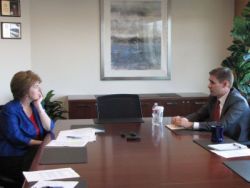 Sean: I was planning to get a master's in Public Policy. But I noticed that the political appointments who had come in to run these administration departments were all lawyers. I had always had this passion for writing, liked the law and had done my field study work in the law. So I decided I was going to go to law school and I applied to law school while I was at the White House.
Sean: I was planning to get a master's in Public Policy. But I noticed that the political appointments who had come in to run these administration departments were all lawyers. I had always had this passion for writing, liked the law and had done my field study work in the law. So I decided I was going to go to law school and I applied to law school while I was at the White House.
Val: Why did you decide to attend NYU Law?
Sean: I applied all over the country. I knew I was going to eventually end up back in California, but I thought it would be great to have a few years of experience somewhere else. I was all set up to go to the University of Virginia for law school, when I got a phone call while on Air Force 2 from my roommate at the time, another Irvine graduate, who told me I got an acceptance letter from NYU. I didn't think anything of it because, at the time, it was the most expensive school in the country. I decided to visit NYU, so I called the NYU Dean's Office told them that I was going to come for a visit. When I arrived, the Dean met me himself. After he takes me for a tour and makes a pitch on why I should be at New York. It turns out that his wife went to college with Hillary Clinton—so there's a connection—which is why he took special interest in me and he liked that I had come up by my own boot straps and put myself through school. So Saxton says to me, "How can I convince you to go to NYU Law School?" I said, "I love it but it's just a financial issue for me because I'm putting myself through school." He said, "How much of a difference can it be really?" I said, "$12,000.00 a year." "If I can give you a $12,000.00 a year scholarship, will you commit to the school?" I was an aspiring lawyer so I said, "Will you put it in writing?" He gets up and he walks out and I thought I had offended him. He came back and we were talking politics and things, and in comes his assistant with a letter saying, Law Center Foundation Scholarship, $12,000.00 a year for three years. So that's how I ended up at NYU.
Val: At this point you are not thinking you will be a practicing lawyer, rather you will use law school to get further trained to do policy work? But then I see that's not exactly what happens.
Sean: That is right, it's not what happens. I loved law school, I had a great experience, but even with the Law Foundation Scholarship, I came out with $100,000 in loans. So I made a decision to move back to the West Coast and practice law for a couple of years at O'Melveny & Myers, which is a big L.A. based firm. I went there because Warren Christopher, who was Secretary of State for Clinton, had been the Chairman of that firm and it was imbued with a public ethic. They encourage their attorneys to be involved in civic life. It was a great time. I was coming out of school in '97, and there was 100% placement rate and the economy was booming.
Val: Did you get into financial work at this point?
Sean: I wanted to go on the transactional side rather than the litigation side. This was during the explosion of the real estate investment trusts. Financing real estate with the capital markets was just starting, as opposed to just insurance companies and the other ways. O'Melveny was on the cutting edge of this. I had only been with the firm for a couple of years when they had me work with a major client, Warner Brothers. They were investing in the internet boom, and they were doing a national search for general counsel for their new division. In the meantime, they needed someone to help them just do the work, so off I went. My job was to help them transition to whoever would be their permanent legal counsel. I started doing deals for them and got to know the people who ran the divisions. In about three months, they wanted to hire me and I told them that I would work for them, but I did not want to be just a lawyer. I wanted to be half business and half law because I wanted to transition towards the business side. I didn’t want to be pigeon holed. So they gave me the job, saw my value and within about four months, I hired another O'Melveny attorney to work for me and I gave him 100% of the legal work. When the internet bubble blew up in 2000, so they moved me over to a strategic planning group. It was very exciting because it broadened my experience quite a bit beyond just new media and technology to the broad aspects of making investments for AOL Time Warner. That's where I really got a passion for the investment side of the business which is what I've done for 12 years now.
Val: How did you then start working for CityView?
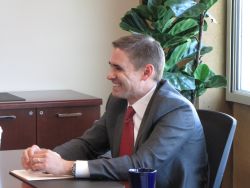 Sean: I continued to have this passion for politics and public policy, so I started a group in L.A. called Democratic Leadership for the 21st Century. It was made up of other young professionals who had a passion for politics but also had a day job. It was very important to me not to be just a fund-raising group, but to establish ourselves as smart policy group. I started to think about real estate again because I had done real estate capital market work when I was at O'Melveny. I started to see the big intersection with communities, community groups, planning, and cities. It seemed that real estate was a way I could marry my love of investing with my love of public policy. CityView was just getting formed at the time. It was a tiny little firm of three people. They had a small allocation from CalPERS, but they needed someone to come in and do deals.
Sean: I continued to have this passion for politics and public policy, so I started a group in L.A. called Democratic Leadership for the 21st Century. It was made up of other young professionals who had a passion for politics but also had a day job. It was very important to me not to be just a fund-raising group, but to establish ourselves as smart policy group. I started to think about real estate again because I had done real estate capital market work when I was at O'Melveny. I started to see the big intersection with communities, community groups, planning, and cities. It seemed that real estate was a way I could marry my love of investing with my love of public policy. CityView was just getting formed at the time. It was a tiny little firm of three people. They had a small allocation from CalPERS, but they needed someone to come in and do deals.
Val: It was a big disconnect to go from Warner Brothers to a real estate investment firm of three, right?
Sean: Yes, it was financially risky and a new industry for me. I hadn't done real estate investment before. I had done real estate law and I had done media technology investment. I thought it was good way to get in on the ground floor of something. So I joined CityView in the fall of 2003. Today we have 40 employees and we just closed our 60th transaction. We have done about $2 billion worth of development around the country.
Val: Tell me about a project or a transaction that you think epitomizes the good work you're doing?
Sean: The first project I worked on at CityView was building homes in the parking lot of the Hollywood Park race track in Inglewood. We built 122 single family homes on small lots. At CityView we build what we call “workforce housing,” which is focused on teachers, firefighters, nurses, police officers, and government workers. The homes are affordable in the market. This work force is so critical at making our cities operate, and they can't afford to live in our urban centers. So we had a business model where we focused on getting private sector money-pension fund money that delivers the same return they would get with anybody else. But instead of building luxury high rises, condos on the beach, or big office buildings, we build housing for working people including the people that they serve, their pensioners.
Val: Was this considered a radical idea at the time?
Sean: Yes, it was. We called it the “double bottom line.” The first line is the economic bottom line. The second line is the social bottom line of improving communities. For the Inglewood project, we had the equity from CalPERS but we needed to borrow 70% of the cost from a bank. The banks told us we were crazy. They said, "Inglewood? New homes in Inglewood? Are you crazy? No one is going to live there." There hadn't been anything new built there in 20 years. But we really believed in it. We finally found a bank to give us a loan and we got the project built, 122 homes and 1,500 people showed up on our first day to buy. It became our most successful project.
Val: I appreciate your story because so often people have some part of the puzzle. They have the “do gooder” part or the financial part, but you have it all. At CityView is this still the agenda - to try to do well by doing good or doing good by doing well?
Sean: The goal is to try to do it all. Yes this is still the goal of CityView, but we shifted as the market turned in 2008. We shifted to rental housing, to do workforce rentals. We own about 2,500 units today of workforce rental housing primarily in California. We just launched a large new building project in the Mission Bay Area, which is the big redevelopment area right now.
Val: Where's your passion now and where does it take you in the future?
Sean: I have a real passion for cities, so I sit on the Los Angeles City Planning Commission, which is a great experience because I can help shape public policy. Every land use ordinance, as well as every major project, comes through the City Planning Commission.
Val: I see your whole career trajectory is one that changes right when you are excelling.
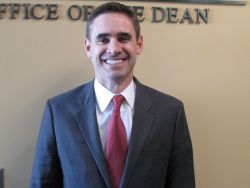 Sean: We will see where life takes me. Right now I definitely want to continue to build CityView because I feel that we are one of the few firms in our industry that has survived the economic down turn. A lot of our competitors went out of business or were wounded, but CityView has actually grown.
Sean: We will see where life takes me. Right now I definitely want to continue to build CityView because I feel that we are one of the few firms in our industry that has survived the economic down turn. A lot of our competitors went out of business or were wounded, but CityView has actually grown.
Val: What do you think made the difference for CityView?
Sean: What made the difference was our focus on urban workforce housing because even in the worst part of the market, that is the fattest part of the pyramid. The firefighters are still working. The nurses are still working. They still need a place to live. Maybe they can't pay as much as they could have paid a couple of years before, but there is a lot of demand at that level. It is much different than building multi-million dollar condos overlooking the ocean, which depends on the market and many different issues.
Val: What is left to accomplish? Looking in the future 10 years or more, where do you see yourself?
Sean: At some point, I would love to do full-time public service either at the state level or federal level. I think that would be interesting. I'm passionate about cities and urban renewal issues. I also am very passionate about national security issues. I spent eight years as a Naval reservist as an intelligence officer. Lastly, I would love to write a book. As I mentioned, my dad was a writer and I have always wanted to write. There is a lot left to do, but right now I am in a good place. CityView is strong and growing. I really have learned a lot at CityView over the last decade.
Val: Do you have any advice for Social Ecology students?
Sean: Yes. Prepare yourself! You need to have a good foundation like I had at UCI in Social Ecology and then in law school. Next, you have to work hard at every job and improve yourself. Lastly, you have to be open to new opportunities and be willing to try new things.
Val: If I talk with the people that know you the best, how would they describe you?
Sean: That's a hard question. I think they would describe me as driven, passionate and family focused. I also think they would describe me as intellectually curious. I'm always trying to come up with new ideas and innovative things. My goal is to not just be resting on my laurels.